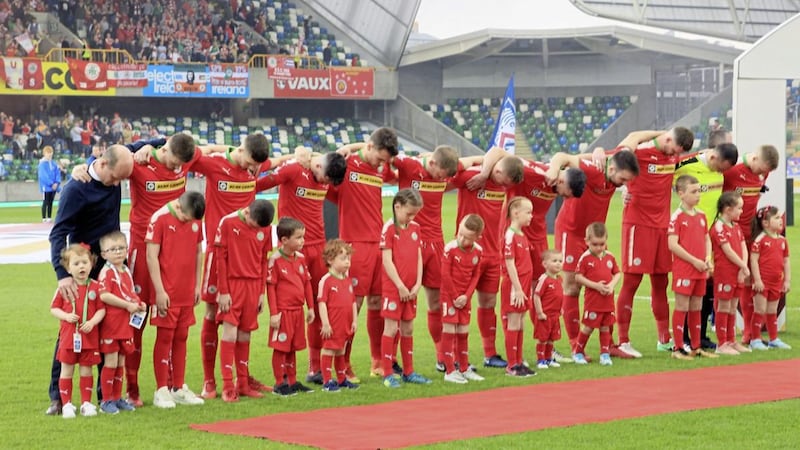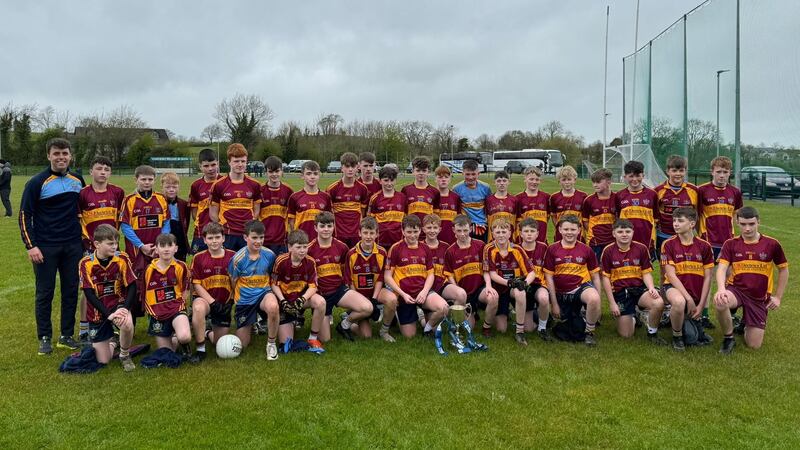“I like the dreams of the future better than the history of the past.”
Thomas Jefferson
*****
THERE have been few sporting own goals as spectacular, or dripping in irony, as the IFA’s decision to play God Save The Queen before Saturday’s Irish Cup final.
From an organisation that has been in the headlines in recent months complaining about young nationalists opting to play for the Republic of Ireland, it was about as backward and counter-productive a move as they could have dreamt up.
The decision hid in plain sight for five years. Having made a call not to play it ahead of the 2009 and 2013 finals, both involving Cliftonville, the IFA’s board made a decision that autumn that it would not happen again – after the DUP had sent a delegation to meet with them.
And so Cliftonville’s request that the same courtesy again be extended this time around was rejected and, in the words of political commentator and Reds season ticket holder Chris Donnelly, “almost injected poison into the environment.”
In the space of a few short days, every stride that Irish League football has made in recent weeks, months and even years was rendered a waste.
This has become the usual green or orange debate, with Cliftonville on one side and Coleraine perceived to be on the other.
The latter offered no public affiliation in the debate but their team contains a number of players from nationalist backgrounds.
Those men stood unbowed, but it’s clearly an uncomfortable few moments as the boos ring out from the sea of red at their backs.
They can’t be seen to be disrespectful, but equally their stomachs must be churning, thinking about how they’ll be perceived back in their own community.
The idea of respecting an anthem is two-fold. The crowd fell stony silent in Croke Park when history was made in 2007 as the British anthem rang out for the first time through a ground where their country’s troops shot 14 people dead in 1920.
It had taken a long time to get to that point, but the Irish crowd accepted it largely because they weren’t being asked to recognise it as their own anthem.
It was a warm hand across the divide but equally, they would get a chance to display their own patriotism within seconds when Amhrán na bhFiann quickly followed.
Yet for every John Hayes, bawling his eyes out in a memorable display of national pride that manifested itself in a brilliant Irish performance, there’s a Rory Best, standing with his head half-bowed, looking at the turf in awkward silence, just as he has always done.
And why shouldn’t he? He shouldn’t be asked to recognise an anthem that’s not his own any more than those Cliftonville or Coleraine players should have been.
This sadly remains a divided part of the world. The Armalite has been stowed away, but the ballot box has not provided the answers we hoped it would when the Good Friday Agreement was signed 20 years ago.
Even with the admission that you’re looking through nationalist eyes, a lot of it is at the door of unionism. While Sinn Féin’s new leader Mary Lou McDonald recently backed a unionist candidate for election and followed Martin McGuinness’s lead in referring to ‘Londonderry’ in the presence of a unionist audience, could you ever imagine Arlene Foster reciprocating?
It’s not always about what you believe yourself, but having the common decency to respect what others believe.
The nationalist community can feel rightly aggrieved by the IFA’s decision to play God Save The Queen at the Irish Cup final.
But here’s the thing: the nationalist community can be every bit as protective of Amhrán na bhFiann, and every bit as belligerent when its presence is threatened.
There won’t be a Championship match this year in football, hurling or camogie, at club or inter-county level, where it isn’t the last thing we do before the ball’s thrown in.
I’m a nationalist, proud to be Irish and that is the anthem I recognise as mine. But its only existing impact in the GAA is to be continually divisive.
The organisation was founded and built on certain ideals, but that was a century ago. And while it has remained much more pertinent in the north right up until the present day, there comes a time when we need to ask ourselves why we’re still doing this.
The IFA’s idea of ‘Football for All’ was labelled a ‘marketing gimmick’ after the events of the weekend, but isn’t the idea of the GAA being a truly inclusive sporting organisation every bit as weak?
I can be a nationalist and a GAA player without any need to link the two. I play Gaelic football for the sense of pride in my homeplace, for the friendship it creates, and for the game itself. I wouldn’t imagine having a few Protestant team-mates would do anything to alter that.
While it continues to parade what it sees as its national anthem, the GAA is still just as much a cold house for unionism as the IFA had made theirs for nationalism. And what good is all of that serving anybody?
Politicians have always used sport to score points and drive agendas. But until we ban flags and anthems from all sporting events, it will continue to be a source of division rather than unity, and the dreams of the future will always be stunted by the history of the past.







